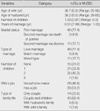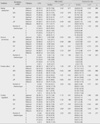Abstract
Purpose
The purpose of the study was to investigate the relationships between the Myers-Briggs Type Indicator (MBTI) psychological type and marital satisfaction, divorce proneness, positive affect, and conflict regulation in couple visiting a clinic.
Methods
Couples (n=62) who visited "M" couple clinic participated in the study. Data were collected from March to June 2009 using the Marital Satisfaction Scale, Marital Status Inventory, Positive Affect Inventory, and Conflict Regulation Inventory.
Results
The couples showed no significant differences in marital satisfaction, positive affect, and conflict regulation according to similarities between spouses in MBTI types. However, they showed significant differences in divorce proneness of husband according to a similarity in the Sensing/Intuition indicator. They also showed significant differences in divorce proneness, positive affect, and conflict regulation between the couples for ISTJ (Introversion, Sensing, Thinking, Judging) or ESTJ (Extraversion, Sensing, Thinking, Judging) types compared to other couples.
Conclusion
When nurses counsel couples, they should understand that differences in psychological type between spouses affects their marital relationship. In addition, nurses should educate couples on the characteristics of each type according to the couple's types and help them to understand each other, especially for couples where one spouse is the ISTJ/ESTJ type. These interventions will improve marital satisfaction and prevent the divorce in these couples.
Figures and Tables
Table 3
MBTI Psychological Types of the Couples and Marital Satisfaction, Divorce Proneness, Positive Affect, and Conflict Regulation by the MBTI Psychological Types of Each Spouse

References
1. Amato PR, Hohmann-Marriott B. A comparison of high- and low-distress marriages that end in divorce. Journal of Marriage and Family. 2007. 69:621–638.
2. Borenstein M, Rothstein H, Cohen J. Power and precision. 1997. Mahwah, NJ: Lawrence Erlbaum.
3. Botwin MD, Buss DM, Shackelford TK. Personality and mate preferences: Five factors in mate selection and marital satisfaction. Journal of Personality. 1997. 65:107–136.
4. Choi GR. A study on types of family systems, marital conflicts and coping strategies. Korean Journal of Home Manage Association. 1994. 12:140–152.
5. Choi HK, Noh CY. The types of marital problem solving behaviors among Korean married men and women. Korean Journal of Home Manage Association. 1994. 12:262–272.
6. Davila J. Johnson SM, Whiffen VE, editors. Attachment processes in couple therapy. Attachment processes in couple and family therapy. 2003. New York, NY: The Guilford Press;124–143.
7. Gottman JM. The marriage clinic: A scientifically based marital therapy. 1999. New York, NY: W. W. Norton & Company.
8. Gottman JM, Notarius C. Decade review: Observing marital interaction. Journal of Marriage and Family. 2000. 62:927–947.
9. Harmon MJ. Watts RE, editor. Using Jungian type psychology to value complementary preferences in couples. Techniques in marriage and family counseling, Vol. 1: The family psychology and counseling series. 2000. Alexandria, VA: American Counseling Association;17–23.
10. Heavey CL, Layne C, Christensen A. Gender and conflict structure in marital interaction. Journal of consulting and clinical psychology. 1993. 61:16–27.
11. Jones JH, Sherman RG. Intimacy and type: A practical guide for improving relationships for couples and counselors. 1997. Gainesville, FL: Center for Applications of Psychological Type.
12. Jung CG. Psychological Types. 1971. Princeton. NJ: Princeton University Press.
13. Kim EJ, Hwang KR, Kwun YU. Relationship among spouse's psychological types, self-esteem, and communication. The Korean Journal of East West Science. 2007. 10:15–26.
14. Kim JT, Shim HS. A validity study on Korean version of the Myers-Briggs Type Indicator (MBTI). Korean Journal of Counseling and Psychotherapy. 1990. 3:44–72.
15. Kim JT, Shim HS, Je SB. Theory, psychometrics application. 1995. Seoul: Korean Psychological Testing Institute.
16. Kim YH. Marital quality and stability: A theoretical model. Journal of Korean Home Economics Association. 1999. 37(6):77–96.
17. Kong SS. Influencing factors of marital satisfaction in couples: Non-distressed couples vs clinical couples. Journal of Korean Academy of Psychiatric and Mental Health Nursing. 2006. 15:434–445.
18. Kong SS. Impact of psychological factors on marital satisfaction and divorce proneness in clinical couples. Journal of Korean Academy of Nursing. 2008. 38:550–560.
19. Korea Marital Relationship Enhancement Institute. Clinical application of Gottman's marital therapy model. 2004. Seoul: Author.
20. Kwon JH, Chae GM. A validation study of the Korean marital satisfaction inventory. Korean Journal of Clinical Psychology. 1999. 18:123–139.
21. Lee HS, Kim KY. Relationship between the marital conflicts and conflict coping behavior according to their personality type consistency. Journal of the Korea Academy of Psychological Type. 2005. 12:51–79.
22. Lee IS, Yoo YJ. An assessment of the validity of the marital satisfaction scale. Korean Journal of Home Management Association. 1986. 4:1–13.
23. Park YH, Ko JH. The effects of self and spouse's self-esteem, communication, conflict coping behaviors on marital satisfaction. Korean Journal of Social and Personality Psychology. 2005. 19:65–83.
24. Previti D, Amato PR. Why stay married? Rewards, barriers, and marital stability. Journal of Marriage and Family. 2003. 65:561–573.
25. Roach A, Frazier L, Bowden S. The marital satisfaction scale: Development of a measure for intervention research. Journal of Marriage and Family. 1981. 43:537–545.
26. Rogge RD, Bradbury TN, Hahlweg K, Engl J, Thurmaier FJ. Predicting marital distress and dissolution. Journal of Family Psychology. 2006. 20:156–159.
27. Vinacke WE, Shannon K, Palazzo V, Balsavage L, Cooney P. Similarity and complementarity in intimate couples. Genetic, Social and General Psychology Monograp. s. 1988. 114:53–76.
28. Weiss RL, Cerreto MC. Development of a measure of dissolution potential. American Journal of Family Therapy. 1980. 8:80–85.
29. Williams L, Tappan T. The utility of the Myers-Briggs perspective in couples counseling: A clinical framework. American Journal of Family Therapy. 1995. 23:367–371.
30. Yun HK, Lee SH. The relationships among spouse's similarity of the Myers-Briggs Type Indicator (MBTI) psychological types and marital communication, marital satisfaction. Journal of the Korea Academy of Psychological Type. 2000. 7:1–21.




 PDF
PDF ePub
ePub Citation
Citation Print
Print






 XML Download
XML Download